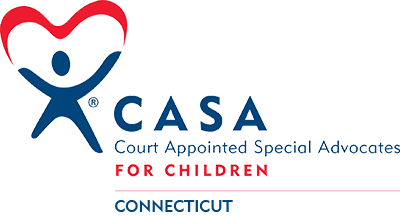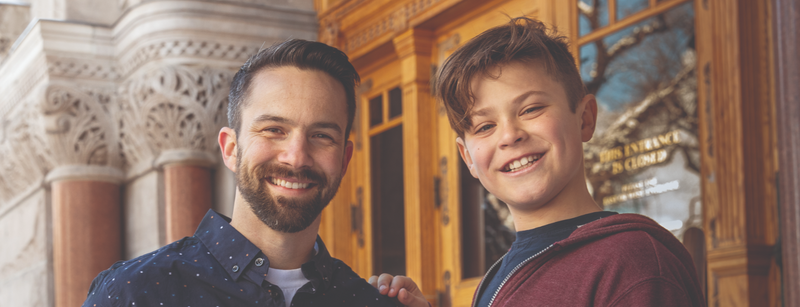Frequent Questions
- Where are Connecticut CASA volunteers currently available?
- Is it difficult to find volunteers who will make this commitment?
- Do you have to be an Attorney to serve as a CASA volunteer?
- What are the requirements for becoming a CASA volunteer?
- What does CASA training involve?
- In what format is the training offered?
- What is the monthly time commitment for a CASA volunteer?
- Can CASA volunteers be assigned to cases outside of a program’s immediate service area if a Judge requested one?
- How is a CASA different from a GAL?
- Can a child have both a CASA and a GAL?
- Are CASA volunteers trained to testify and be cross examined in trials?
- What happens if a CASA volunteer has a different perspective than DCF’s recommendations or case plan?
- Are CASA volunteers able to continue to play a role in their case children's lives as they transition back home to ensure appropriate care and services post-reunification?
-
Where are Connecticut CASA volunteers currently available?
CASA volunteers will be provided by 3 different programs; CASA of SW Connecticut, CASA of Northern Connecticut, and CASA of Southern Connecticut. CASA of SW Connecticut currently serves children in Fairfield County. We are working collaboratively with the judiciary to identify the inaugural court locations to be served by CASA of Northern Connecticut and CASA of Southern Connecticut. We will establish a statewide growth plan from that point.
-
Is it difficult to find volunteers who will make this commitment?
Connecticut residents have shown great interest in volunteering for CASA. CASA of SW Connecticut continually receives applications without recruiting and has many trained volunteers waiting for cases. Our State office also frequently receives inquiries from prospective volunteers through its website, especially from new Connecticut residents who’ve experienced CASA in other states. While volunteer recruitment is challenging for all volunteer-based organizations, the national CASA movement continues to grow.
-
Do you have to be an Attorney to serve as a CASA volunteer?
No. CASA volunteers are people from all walks of life, who have been screened and trained extensively by their local CASA program. These CASA programs provide screening, training and support for volunteers through each step of gathering information and advocating for a child in court and in the community.
-
What are the requirements for becoming a CASA volunteer?
You must be 21 years of age or older, complete our application and screening process along with a background check, and attend our 30+ hour pre-service training program. CASA volunteers are also required to complete 12 hours of continuing education annually after being appointed. You must have a commitment to best interest advocacy for children.
-
What does CASA training involve?
Our pre-service training involves 30 hours of coursework covering a range of essential topics for working with children and families in the child protection system. The CASA training curriculum is nationally recognized and unique to CASA affiliate programs. The model emphasizes collaboration with the Department of Children and Families (DCF), attorneys, and service providers to ensure that the child is receiving personalized attention on a routine basis and that the child is receiving services needed. Topics include family strengths and engagement, reunification, parental substance abuse, cultural competency, at-risk youth, and acute trauma.
-
In what format is the training offered?
Our pre-service training is offered either as a 30 hour in-person training, or as a FLEX curriculum that includes online course work and in-person sessions. Continuing education credits may be offered in person or online depending on your local program.
-
What is the monthly time commitment for a CASA volunteer?
The monthly commitment varies depending on what’s happening with your case. Volunteers spend an average of 10 - 20 hours per month on each case. The first two to three months of a case tend to be more time-intensive due to the volume of the initial information received, contacts to be made, hearings to attend, and visits to see the child.
-
Can CASA volunteers be assigned to cases outside of a program’s immediate service area if a Judge requested one?
Generally no. However, we will be establishing a growth plan for the state with an aspiration of serving all eligible children and courts in Connecticut.
-
How is a CASA different from a GAL?
- In Connecticut, we are governed by separate statutes. The CASA law (Title 51, Chapter 815t, Section 46b-129a) allows for the Court to appoint a CASA volunteer on its own motion or the motion of a party in any proceeding in which a petition is filed under section 46b-129 or 46b-149 of the general statutes.
- GAL appointments are determined according to the GAL law (Title 51, Chapter 815t, Section 46b-129c). GALs are appointed at the request of a child’s attorney in cases wherein there is a conflict of interest between a child’s expressed wishes, and a child’s best interests.
- CASA volunteers serve exclusively on child protection cases under the Superior Court for Juvenile Matters; GALs work in both probate and the superior court with a variety of vulnerable populations.
- A CASA volunteer can work with a youth until age 23 if the youth remains in DCF care. GAL appointments terminate when a youth reaches the age of 18.
- The CASA training curriculum is nationally recognized and unique to CASA affiliate programs. Our model also emphasizes a partnership with DCF and children’s attorneys to ensure that the child is receiving personalized attention on a routine basis and that both the child and his/her family are receiving the services they need.
- In Connecticut, we are governed by separate statutes. The CASA law (Title 51, Chapter 815t, Section 46b-129a) allows for the Court to appoint a CASA volunteer on its own motion or the motion of a party in any proceeding in which a petition is filed under section 46b-129 or 46b-149 of the general statutes.
-
Can a child have both a CASA and a GAL?
Technically, yes, with the Court’s approval, a child could conceivably have a CASA and a GAL depending on the case and the needs of child.
-
Are CASA volunteers trained to testify and be cross examined in trials?
Yes, CASA volunteers are trained to appear in court and their work throughout their assignment is guided and supported by CASA staff. Various professionals related to the case will inquire and possibly challenge your recommendations. This is a necessary part of the process to encourage us to check and re-check for bias and to promote well-founded recommendations for important life-impacting decisions. Your CASA supervisor will guide you through each step of the process to help you advocate for your assigned child.
-
What happens if a CASA volunteer has a different perspective than DCF’s recommendations or case plan?
When disagreements arise, a CASA volunteer works directly with a CASA supervisor to provide a clear basis for recommendations while respecting various viewpoints.
-
Are CASA volunteers able to continue to play a role in their case children's lives as they transition back home to ensure appropriate care and services post-reunification?
As long as the case remains open, the CASA volunteer continues to advocate for the best interests of the child in the courtroom and the community, regardless of where the child resides. In cases of older youth, especially those over 18 aging out of the system, the relationship between the youth and the CASA volunteer may continue on their own terms after the case is closed.
If you have additional questions, please contact info@CASAsouthCT.org or 203.800.5661.


